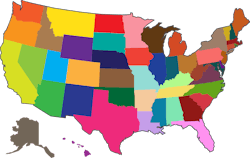New tool ranks COVID-19 responses of 19 hard-hit nations
The United States ranks ninth out of 19 based on a newly developed tool to evaluate public perception of different countries' responses to the COVID-19 pandemic, according to a study published in PLOS One and covered in a news report from the Center for Infectious Disease Research and Policy (CIDRAP) at the University of Minnesota.
The 10-item COVID-SCORE tool, created and validated by the Barcelona Institute for Global Health, the City University of New York (CUNY), and other international organizations, was used in mid-June to survey the attitudes of 13,426 randomly selected participants in 19 countries heavily affected by the pandemic on key issues such as governmental messaging, access to health services, and social welfare.
Mean country score ranged from 35.76 out of 100 points for Ecuador to 80.48 for China. In general, Asian countries garnered better scores than Latin American and European nations.
Country scores were strongly tied to the level of people's public trust in their government, with higher scores reflecting higher levels of trust. Lower scores were associated with higher COVID-19 death rates or proportion of participants directly affected by the virus, in addition to low levels of trust.
The United States' composite score was 50.57, with 773 respondents. At 3.16 out of 5, the country's income, food, and shelter aid were the highest-rated facet of its pandemic response, while it was among the lowest in most countries. Notably, the poll was administered soon after U.S. government stimulus checks were distributed in the spring.

